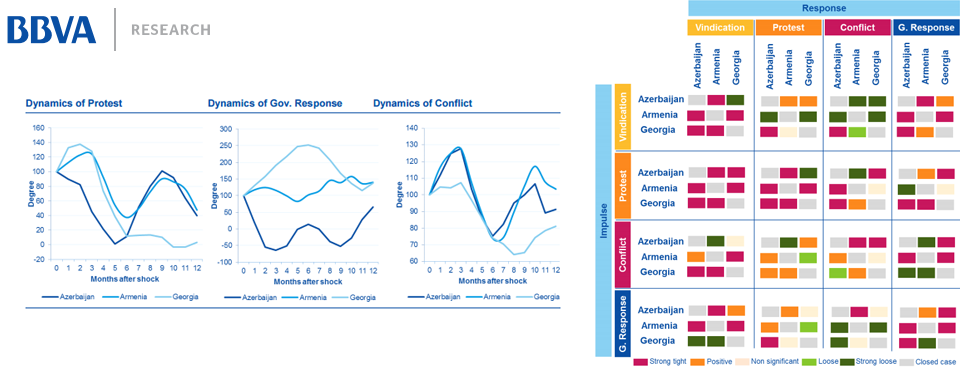
The research staff at Banco Bilbao Vizcaya Argentaria (BBVA)’s Cross-Country Emerging Markets Unit have produced another series of captivating risk visuals, this time of as part of their paper titled "An Empirical Assessment of Social Unrest Dynamics and State Response In Eurasian Countries", published in the Eurasian Journal of Social Sciences. The abstract is reproduced below:
This paper shows an empirical assessment of social unrest dynamics in the Eurasian countries. We use a big database of social events (GDELT) to build up several real time indexes of social unrest escalation by social agents divided in several stages consistent with the Unrest Lifecycle Theory (vindication, protest and conflict) and alternatives measures of state response (repression and cooperation). We build a Vector Autoregressive (VAR) model to analyse the unrest dynamic cycle of social agents and state response. Our results show that Eurasia is a fairly volatile region in what shock-generation and inertia relates. Social reactivity is also relevant but we find that this is stronger at the initial stages of unrest while it decays as the intensity of shocks increases. Repressive state response is a fact but it decays too in intensity as the conflict escalates along the unrest cycle, falling even into an accommodative mode. We attribute this behaviour to the limited state enforcing ability of among other things. Unrest and government action are not homogenous across the region, West and Central Eurasia are more prone to conflict escalation and their enforcing ability of the state is also lower. This gives an insight were prevalent unrest theories such as unrest lifecycle; deterrence and backslash seem more dominant. We also find traces of spill over-effects or contagion among countries who share boundaries but the intensity and sign is undefined. We compare these stylized facts against the MENA region and suggest that Eurasia carries similar though milder dynamics in all terms, volatility and reactivity of social unrest, state response and enforcing inability and contagion.